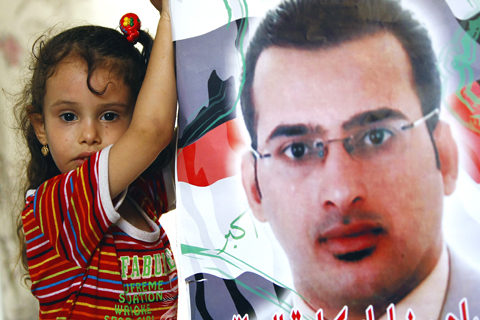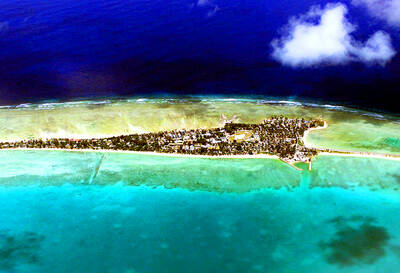As his size 10s spun through the air toward former US president George W. Bush, Muntazer al-Zaidi — the man the world now knows as the shoe-thrower — was bracing for a US bullet.
“He thought the secret service was going to shoot him,” says Zaidi’s younger brother, Maitham. “He expected that, and he was not afraid to die.”
Zaidi’s actions during the former US president’s swansong visit to Iraq last December have not stopped reverberating in the nine months since. Next Monday, when the journalist walks out of prison, his 10 raging seconds, which came to define his country’s last six miserable years, are set to take on a new life even more dramatic than the opening act.

PHOTO: AFP
Across Iraq and in every corner of the Arab world, Zaidi is being feted. The 20 words or so he spat at Bush — “This is your farewell kiss, you dog. This is for the widows and orphans of Iraq” — have been immortalized, and in many cases memorized. Pictures of the president ducking have been etched onto walls across Baghdad, made into T-shirts in Egypt and appeared in children’s games in Turkey.
Zaidi has won the adulation of millions, who believe his act of defiance did what their leaders had been too cowed to do. Iraq has been short of heroes since the dark days of dictator Saddam Hussein, and many civilians are bestowing greatness on the figure that finally took the fight to an overlord.
“He is a David and Goliath figure,” said Salah al-Janabi, a white goods salesman in downtown Baghdad. “When the history books are written, they will look back on this episode with great acclaim. Al-Zaidi’s shoes were his slingshot.”
From his prison cell, Zaidi has a sense of the gathering fuss, but not the full extent of the benefactors and patrons preparing for his release.
A new four-bedroom home has been built by his former boss. A new car — and the promise of many more — awaits. Pledges of harems, money and healthcare are pouring in to his employers, the al-Baghdadia television channel.
“One Iraqi who lived in Morocco called to offer to send his daughter to be Muntazer’s wife,” editor Abdul Hamid al-Saij said. “Another called from Saudi offering US$10 million for his shoes, and another called from Morocco offering a gold-saddled horse. After the event, we had callers from Palestine and many women asking to marry him, but we didn’t take their names. Many of their reactions were emotional. We will see what happens when he is freed.”
From the West Bank town of Nablus, Ahmed Jouda saw the incident on television news and felt so moved that he called together his relatives for a meeting in a nearby reception hall.
Jouda, 75, a farmer and head of a large extended family, convinced his relatives to contribute tens of thousands of dollars to support Zaidi’s legal case.
Jouda himself decided to sell half his herd of goats; another man asked if he might offer a young woman from his family as a bride. Jouda said he would ask if Zaidi was interested.
“I said we are willing to present him with a bride loaded with gold,” Jouda said. “We are people of our word. If he decided to marry one of our daughters we would respect what we said.
“We are compassionate and supportive to the Iraqi people for what they have gone through. We are people who have tasted the bitterness, sorrow and agony of occupation too. What he did, he did for all the Arabs, not just the Iraqis, because Bush was the reason behind the problems of all the Arab world.”
Zaidi’s brother insists that no one put Muntazer up to such an act. But he revealed that Muntazer had told him he had pre-scripted at least one line ahead of the fateful press conference.
From the roof of his brother’s new home, Maitham al-Zaidi said: “He always thought he would die as a martyr, either by al-Qaeda or the Americans. More than once he was kidnapped by insurgents. He was surprised that Bush’s guards didn’t shoot him on the spot.”
Muntazer al-Zaidi has told Maitham, and another brother, Vergam, that he is planning to open an orphanage when he leaves prison and will not work again as a journalist.
“He doesn’t want his work to be a circus,” Vergam said. “Every time he asked someone a difficult question they would have responded by asking whether he was going to throw his shoes at them.”
Muntazer has alleged that after his actions he was tortured by government officials. Medical reports say he has lost at least one tooth and has two broken ribs and a broken foot that have not healed properly.
“He will stay in Iraq, but first he has to leave the country to get his health fixed,” Vergam said.
In the run-up to his release, Maitham has a sense of the reception awaiting his brother.
He said: “I feel like Michael Jackson at the moment. Everywhere I go, people are taking pictures of me and asking for my photo. If they do that for me, what will they do for Muntazer himself?”

DISASTER: The Bangladesh Meteorological Department recorded a magnitude 5.7 and tremors reached as far as Kolkata, India, more than 300km away from the epicenter A powerful earthquake struck Bangladesh yesterday outside the crowded capital, Dhaka, killing at least five people and injuring about a hundred, the government said. The magnitude 5.5 quake struck at 10:38am near Narsingdi, Bangladesh, about 33km from Dhaka, the US Geological Survey (USGS) said. The earthquake sparked fear and chaos with many in the Muslim-majority nation of 170 million people at home on their day off. AFP reporters in Dhaka said they saw people weeping in the streets while others appeared shocked. Bangladesh Interim Leader Muhammad Yunus expressed his “deep shock and sorrow over the news of casualties in various districts.” At least five people,

ON THE LAM: The Brazilian Supreme Court said that the former president tried to burn his ankle monitor off as part of an attempt to orchestrate his escape from Brazil Former Brazilian president Jair Bolsonaro — under house arrest while he appeals a conviction for a foiled coup attempt — was taken into custody on Saturday after the Brazilian Supreme Court deemed him a high flight risk. The court said the far-right firebrand — who was sentenced to 27 years in prison over a scheme to stop Brazilian President Luiz Inacio Lula da Silva from taking office after the 2022 elections — had attempted to disable his ankle monitor to flee. Supreme Court judge Alexandre de Moraes said Bolsonaro’s detention was a preventive measure as final appeals play out. In a video made

It is one of the world’s most famous unsolved codes whose answer could sell for a fortune — but two US friends say they have already found the secret hidden by Kryptos. The S-shaped copper sculpture has baffled cryptography enthusiasts since its 1990 installation on the grounds of the CIA headquarters in Virginia, with three of its four messages deciphered so far. Yet K4, the final passage, has kept codebreakers scratching their heads. Sculptor Jim Sanborn, 80, has been so overwhelmed by guesses that he started charging US$50 for each response. Sanborn in August announced he would auction the 97-character solution to K4

SHOW OF FORCE: The US has held nine multilateral drills near Guam in the past four months, which Australia said was important to deter coercion in the region Five Chinese research vessels, including ships used for space and missile tracking and underwater mapping, were active in the northwest Pacific last month, as the US stepped up military exercises, data compiled by a Guam-based group shows. Rapid militarization in the northern Pacific gets insufficient attention, the Pacific Center for Island Security said, adding that it makes island populations a potential target in any great-power conflict. “If you look at the number of US and bilateral and multilateral exercises, there is a lot of activity,” Leland Bettis, the director of the group that seeks to flag regional security risks, said in an